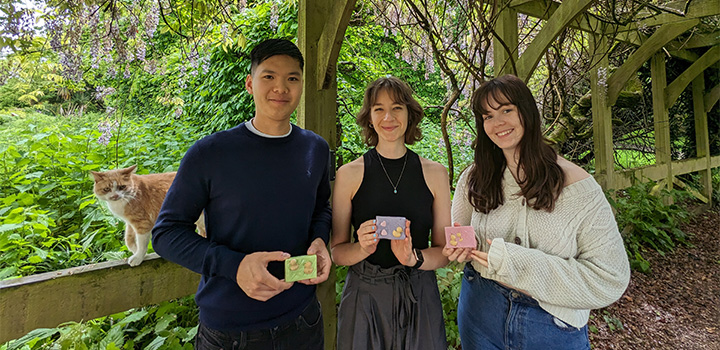Agri-tech funding boost for regional university partnership
By: Communications

The University of East Anglia (UEA) is part of an agri-tech collaboration that has now secured vital research funding to allow for networking and growth of start-ups in the region.
Led by the University of Lincoln, Agri-Tech Global is a partnership that also involves UEA, the University of Cambridge, Cambridge Enterprise and Ceres Agri-Tech. Its aim is to develop a truly global agri-tech cluster in the Greater Lincolnshire and East Anglia region.
The Agri-Tech Global collaboration has now received an award of £1.49 million as part of the Research England Development (RED) and Connecting Capability Fund (CCF) from UK Research and Innovation (UKRI). This funding will allow for the networking and growth of agri-tech start-ups in the region and enable them to connect with larger international agricultural businesses.
Agri-Tech Global will also tackle the serious challenges faced by the industry, from climate change to rising food prices and pressures within the supply chain; it aims to play a major part in mitigating the damage that the sector causes to the environment, by helping to create a more sustainable and economically viable future for the agri-food industry.
UEA is currently ranked as the joint top university in the UK for the quality of its agricultural and food research through the Times Higher Education Rankings for the Research Excellence Framework 2021. Dr Jon Carter, Associate Director of Intellectual Property and Investment Management at UEA said:
“We are delighted to be a partner in developing and delivering this exciting opportunity.
“We’re ranked as the joint top university in the UK for the quality of our agricultural and food research, so we’re well placed to support collaborative work and funding bids that can prove to be transformational for businesses in the region.”
Leading the Agri-Tech Global project is the Lincoln Institute for Agri-food Technology (LIAT) at the University of Lincoln: an inter-disciplinary specialist research institute bringing together sector-leading expertise in a diverse range of areas such as artificial intelligence, robotics, engineering, crop science, environmental sustainability, food manufacturing, product development and supply chains.
Prof Simon Pearson, Director of Lincoln Institute for Agri-food Technology, said: “The Greater Lincolnshire and East Anglian region has enormous potential for the development of a sustainable, affordable and forward-thinking agri-food cluster, not just for the UK but for the world.
“There are many businesses in the area, both established and start-ups, that will benefit from the development of a global network in our region, as well as being able to share best practice and open up new avenues of agri-tech research.”
Climate change is a continual concern within the Agri-food industry. The sector provides 3.9 million jobs and accounts for £129 billion of the UK economy, but this comes at the cost of being responsible for 24 per cent of national greenhouse gas emissions.
Agri-Tech Global hopes to play a major part in mitigating the damage that the sector causes to the environment by helping to create a more sustainable and economically viable future for the agri-food industry.
Ceres Agri-Tech, another partner of the Agri-Tech Global based at Cambridge Enterprise, provides translational funding and commercialisation expertise to drive agri-tech innovation by accelerating high-quality research to market.
Dr Louise Sutherland, Ceres Agri-Tech Project Development Director, said: “This is a fantastic opportunity to evolve Ceres Agri-Tech from a UK to an international network. Agri-Tech Global was formally launched in California with our key partners Western Growers and SVG Thrive. We look forward to collaborating with international partners to help exploit the global agri-tech opportunity for our universities and the region.”
Related Articles

UEA and Hethel Innovation building on solid foundations with new Memorandum of Understanding
UEA and Hethel Innovation have strengthened their longstanding collaborative partnership with the formal signing of a strategic Memorandum of Understanding, recognising a shared commitment to innovation and sustainable economic growth.
Read more
The students creating toiletry kits to address hygiene poverty in Norwich
A student-led initiative at the University of East Anglia (UEA) is helping to address hygiene poverty in Norwich, by creating and distributing hygiene kits to local homeless charities.
Read more